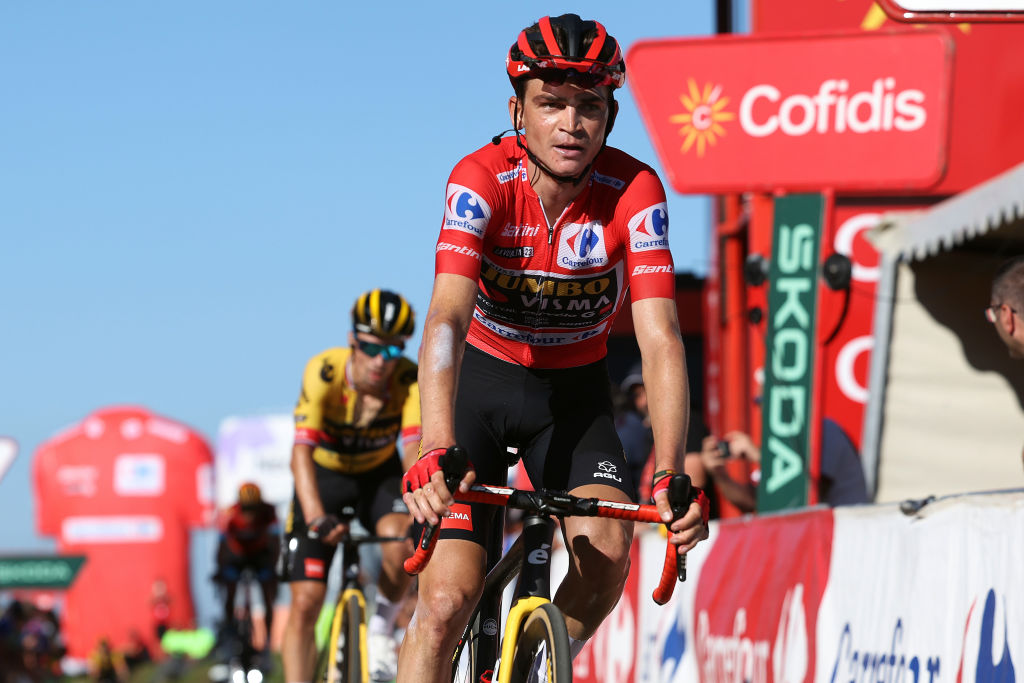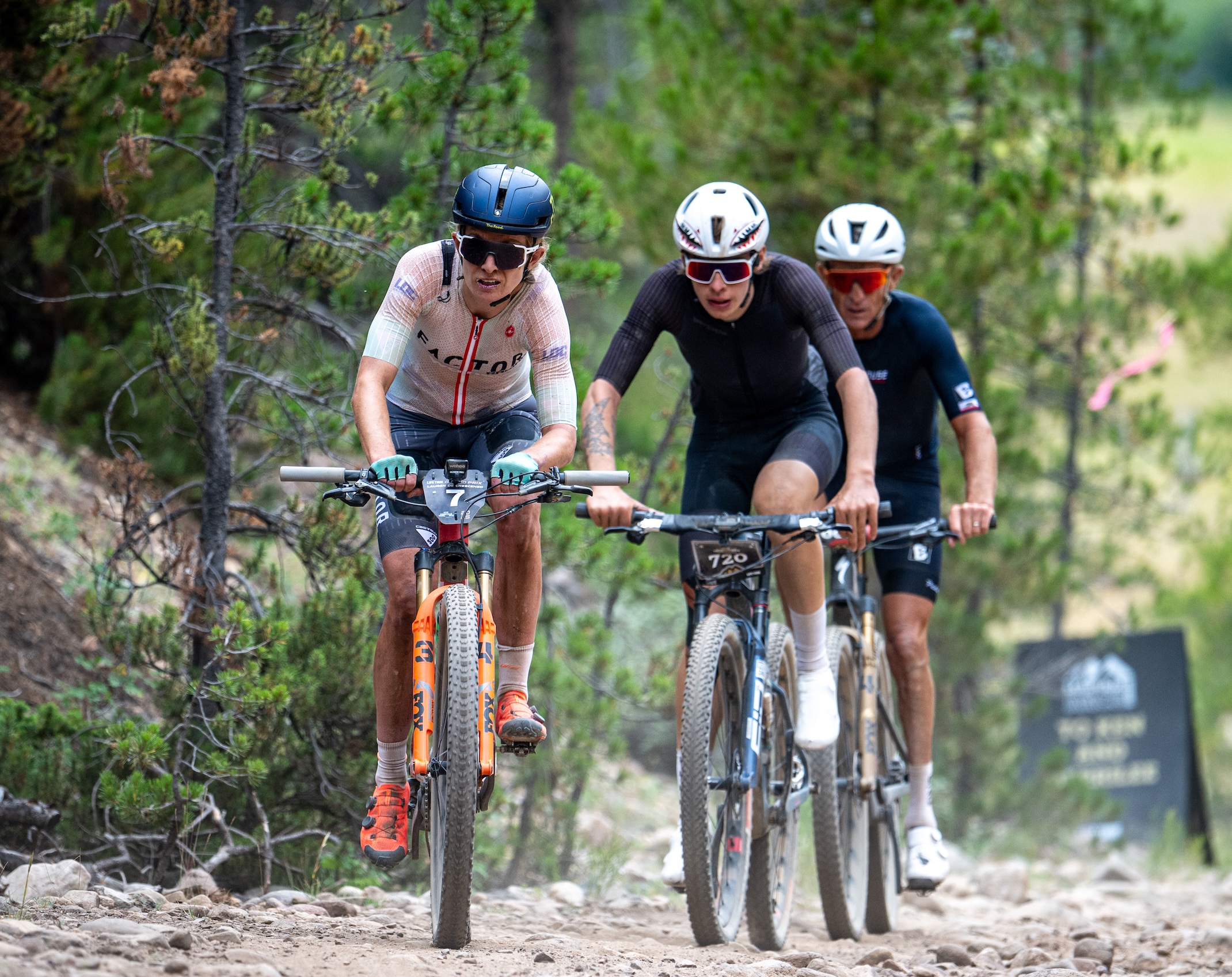Sepp Kuss: I completely deserved to be in this jersey
Vingegaard and Roglic work for American as Jumbo-Visma end internal Vuelta a España rivalry

The latest race content, interviews, features, reviews and expert buying guides, direct to your inbox!
You are now subscribed
Your newsletter sign-up was successful
Sepp Kuss’ pathway towards his first Grand Tour victory at the Vuelta a España cleared notably on Thursday as Jumbo-Visma’s three leaders made a marked switch of tactics, going from ‘every rider for himself’ to a much more conventional defence of the American’s red jersey.
On the previous two summit finishes at Bejes and the Angliru in the third week, Jumbo-Visma’s strategy saw teammates Jonas Vingegaard and Primož Roglič both going for stage wins and making notable inroads on Kuss lead in the process.
But on the second double ascent of the Alto de la Cruz de Linares on stage 18 Thursday, the Dane opted to sherpa the North American up the key segments of the climb, before Kuss responded to some late attacks by Juan Ayuso (UAE Team Emirates).
Kuss subsequently explained that the notable difference in strategy from what had originally been decided on the second rest day was due a radical revision of tactics after the Angliru, which he called 'fair'.
“We discussed what had happened in the two stages before the Angliru, so there was a ‘before’ the Angliru and an ‘after’ and that for me, was fair.”
Referring to the intense controversy and confusion Jumbo’s ‘every man for himself’ tactic had generated in some quarters, Kuss pointed out that “of course there’s always tension when you take yourself out of the race and you see things in a larger scope, but not necessarily in a negative sense.”
He also pointed out that Jumbo’s seizing the top three places on the podium on the Tourmalet and maintaining them deep into the third week - a situation which has not occurred in a Grand Tour in nearly half a century - had made it harder to work out what to do.
The latest race content, interviews, features, reviews and expert buying guides, direct to your inbox!
“There was a lot of negativity [on social media] surrounding those two stages, which was hard to read, because we agreed on our plan before the Angliru,” he said.
“We’d never imagined we’d be the strongest three guys in the race, and that complicated things in a way that we were less reactive than others, and more looking for ways, or wanting to win, which is completely normal. So after yesterday, we had to reel things in and understand the bigger picture.”
Kuss provided extra context to that situation by explaining the leadership role was almost completely new to him. It’s certainly one which he has never had in a Grand Tour, or indeed any stage race since the Tour of Utah back in 2018, and that upward switch in status to put him on a level footing or ahead of established top names like Roglič and Vingegaard was not a straightforward one to assume.
“I never went into this season or this race ever thinking of or wanting any leadership. I was perfectly content in my [domestique’s] role, but then as we know half way through this race, things changed a lot for me, so I was now in this position of leader.”
When the team spoke on the second rest day before the Angliru, he said, he had had “a bit of imposter syndrome, I didn’t know whether it was my place to say how things should be. But every day I believe more in myself, that I completely deserved to be in this jersey and to have the support of the team.”
Asked specifically what the rest day summit meeting between the three Jumbo-Visma leaders had decided, Kuss said that the idea was that they wanted to try to give all three of them their own chance. However, it left them in what he delicately described as a “difficult situation,” reaching the point where his lead was cut back to eight seconds by Vingegaard, and Roglič was able to state in virtually the same breath after the Angliru that he wanted to win the Vuelta but also wanted Kuss to win it too.
“We wanted basically everyone to leave with the feeling that they could leave everything out on the road, which turned into maybe a difficult situation, especially watching on tv or to understand," Kuss said after stage 18.
“But I think the idea was, only speaking for myself, I left everything out there on the road, and I feel like I deserved this place. And then once everything were more concreted on the general [classification], we decided to race in the way we saw today.”
The immediate consequence of going from an ‘all-for-all’ to an ‘all-for-one’ strategy was that rather than any further attacks on Kuss on the last of the northern Spanish mountain stages, Jumbo-Visma simply threw their collective weight behind the American.
“I think first of all the guys did a really great job, first of all pulling the whole day and then on the last two laps of finishing climb,” Kuss enthused in a separate interview before admitting some unspecified “mistakes had been made, but that’s human nature".
“Jan [Tratnik] was there, he came back and rode super-well for us, then Jonas made a really good pace from the bottom. I was a bit scared because he’s so strong [and] his pace isn’t alway the easiest. But he really rode super for me, and today we rode a more defensive tactic.”
Rewriting their strategy after the Angliru is a solution that may silence the social media critics, perhaps, and does away with the spectre of a drawn-out internal power struggle. But it could also spark some degree of unresolved speculation on what the underlying hierarchy of the Jumbo-Visma Vuelta triumvirate could have been, if they had not adopted a more conventional strategy for what is a very unusual GC situation.
With all the high mountain stages behind him and the situation now much clearer internally, Kuss is much closer to winning the Vuelta, but he warned that when it comes to standing tallest on the victory podium in Madrid on Sunday evening he was not yet home and dry .
“I’m getting closer, tomorrow is an easier stage, but stage 20 is long and hard,” he predicted. “We’re out of the big mountains but there are some tough ones to come. I have to stay focussed.”
Alasdair Fotheringham has been reporting on cycling since 1991. He has covered every Tour de France since 1992 bar one, as well as numerous other bike races of all shapes and sizes, ranging from the Olympic Games in 2008 to the now sadly defunct Subida a Urkiola hill climb in Spain. As well as working for Cyclingnews, he has also written for The Independent, The Guardian, ProCycling, The Express and Reuters.

